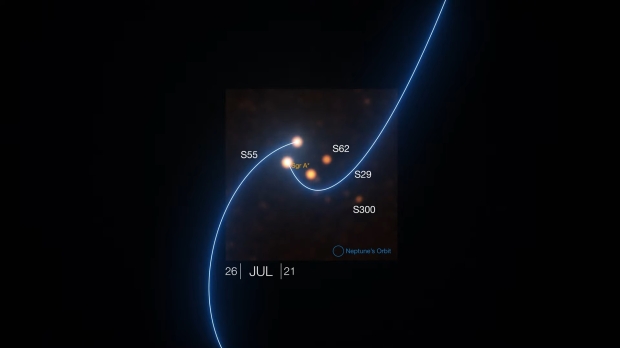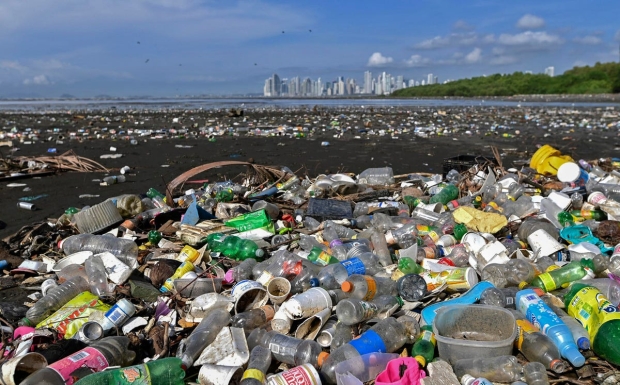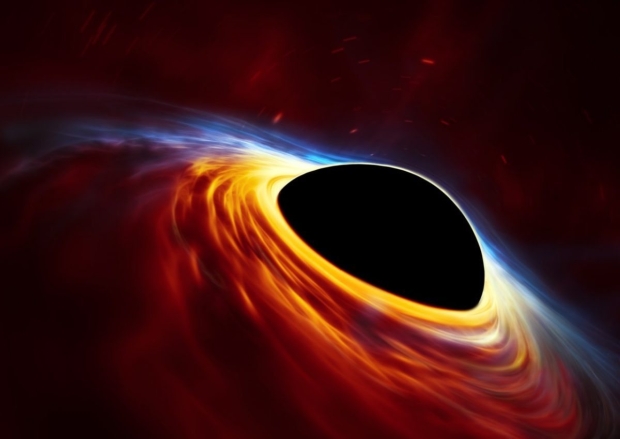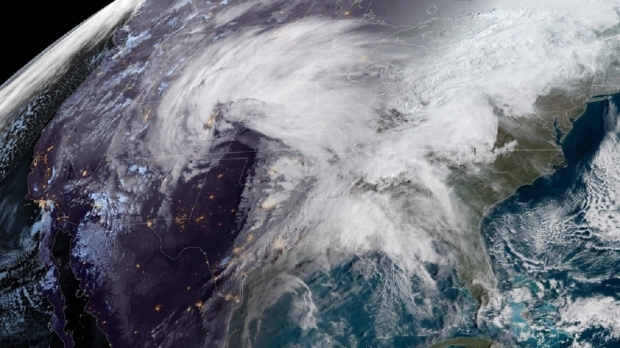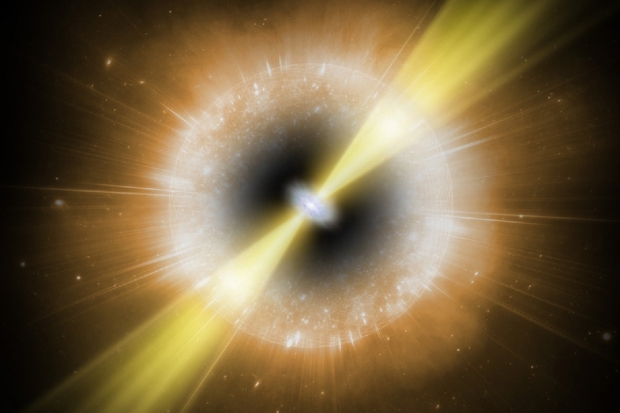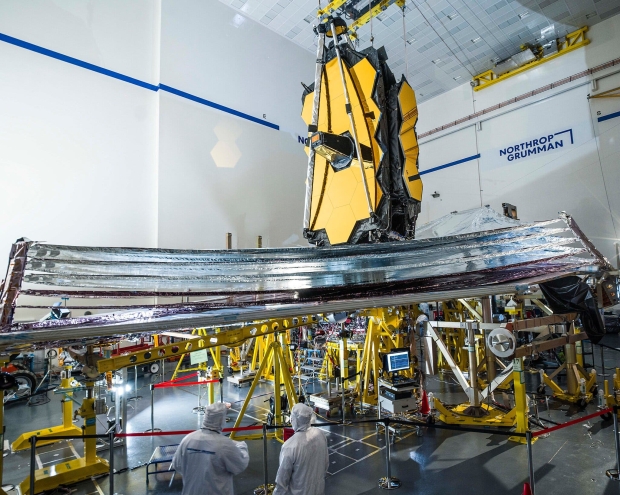Science, Space, Health & Robotics News - Page 221
Watch new star orbit the Milky Way's central supermassive black hole
Researchers from the European Southern Observatory (ESO) have published two papers in the journal Astronomy & Astrophysics showing observations of a newly observed star near the center of our galaxy.
Many stars were captured in images of the Milky Way's central supermassive black hole, Sagittarius A*, using the ESO's Very Large Telescope Interferometer (VLTI). VLTI has enabled image capture at a zoom level twenty times greater than what was possible before. Within the images, astronomers identified a new never-before-seen star, dubbed S300.
"We want to learn more about the black hole at the center of the Milky Way, Sagittarius A*: How massive is it exactly? Does it rotate? Do stars around it behave exactly as we expect from Einstein's general theory of relativity? The best way to answer these questions is to follow stars on orbits close to the supermassive black hole. And here we demonstrate that we can do that to a higher precision than ever before," said Reinhard Genzel of the Max Planck Institute for Extraterrestrial Physics (MPE), who was awarded a Nobel Prize in 2020 for research on Sagittarius A*.
Continue reading: Watch new star orbit the Milky Way's central supermassive black hole (full post)
First Uber Eats delivery makes its safely to the ISS
Arriving recently at the International Space Station (ISS) for an eleven day stay, Japanese billionaire Yusaku Maezawa also brought some Uber Eats to share.
Launching on December 8th, Maezawa brought ready-to-eat canned Japanese dishes to share with the Expedition 66 crew. The meals included boiled mackerel in miso, beef bowl cooked in sweet sauce, simmered chicken with bamboo shoots, and braised pork, a welcome reprieve from the everyday meals aboard the ISS.
"We're over the moon to have helped make the first successful delivery to space. Our goal is to help people go anywhere and get anything, so we're proud to serve the astronauts at the International Space Station. Yusaku Maezawa gets a thumbs up on this delivery, even though it took a bit longer than the usual 30 minutes to arrive," said Uber CEO Dara Khosrowshahi in a statement.
Continue reading: First Uber Eats delivery makes its safely to the ISS (full post)
Nature is responding to plastic pollution with new enzymes
Researchers from the Chalmers University of Technology in Sweden have identified a host of new plastic-degrading enzymes associated with an uptick in plastic pollution.
The researchers analyzed DNA samples from hundreds of locations globally and found a correlation between local levels of plastic pollution and the number of microbial enzymes capable of breaking down said plastic. Computer analysis identified plastic-degrading potential in the DNA, and the results were cross-referenced with official numbers for plastic waste pollution at the locations where the DNA was sampled.
"Using our models, we found multiple lines of evidence supporting the fact that the global microbiome's plastic-degrading potential correlates strongly with measurements of environmental plastic pollution-a significant demonstration of how the environment is responding to the pressures we are placing on it," said Aleksej Zelezniak, associate professor in systems biology at Chalmers University of Technology.
Continue reading: Nature is responding to plastic pollution with new enzymes (full post)
Astronomers just identified over 75,000 new 'bright' black holes
A new technique to help astronomers find and identify 'bright' black holes has been developed by researchers from the University of Western Australia (UWA) node of the International Centre for Radio Astronomy Research (ICRAR).
An active galactic nucleus (AGN) is a compact region of space at a galaxy's center, with higher than average luminosity. The light emissions come from portions of the electromagnetic spectrum that show stars do not produce them and instead indicate an active black hole.
"The black holes we're looking for are between a million and a billion times more massive than our Sun. As they suck in matter from around them, the matter gets super-heated because of friction and becomes very, very luminous. And when they're active, these black holes can outshine the rest of the galaxy," said Jessica Thorne, a Ph.D. student at UWA.
Continue reading: Astronomers just identified over 75,000 new 'bright' black holes (full post)
Officials drop warnings for powerful winds ripping through US
New reports indicate that a powerful storm is moving through several states across the US, bringing dangerous winds and the potential for blizzard conditions.
According to a report from AccuWeather, a "potent" storm is currently ripping through central states in the US with high wind speeds. The storm is expected to swing northeast, where it will bring some snow to the northern Plains throughout the middle of the week. AccuWeather warns that the storm will bring high wind speed to affected areas, which can raise the chances of a fast-moving wildfire in the area.
"Fast movement and limited moisture available to this storm versus last weekend's storm will generally limit the amount of snow to 1-6 inches with locally higher amounts," said AccuWeather Senior Meteorologist Brett Anderson.
Continue reading: Officials drop warnings for powerful winds ripping through US (full post)
Warming climate expected to degrade forecasting abilities
Researchers from Stanford University have published a new study in Geophysical Research Letters, showing how forecasts may become unreliable sooner due to increasingly warmer weather.
An increase of only a few degrees Celsius is enough to reduce the reliability of temperature, wind, and rainfall forecasts by a day. Each degree reduces the accuracy of forecasts by several hours, with a day of accuracy being lost for precipitation with every three-degree rise and a day lost for wind and temperature forecasts for a five-degree rise.
"Our results show the state of the climate in general has implications for how many days out you can say something that's accurate about the weather. Cooler climates seem to be inherently more predictable," said Aditi Sheshadri, the study's lead author.
Continue reading: Warming climate expected to degrade forecasting abilities (full post)
NASA receives a delivery from space containing precious samples
NASA has taken to its blog to announce that it has successfully received a sample that originally came from outer space.
The space agency has posted to its social channels that it has received a Hayabusa2 sample canister that contains fragments of the asteroid Ryugu, which the Japan Aerospace Exploration Agency (JAXA) retrieved in June 2018 when the Japanese spacecraft landed on the asteroid. The Hayabusa2 aircraft departed from the Ryugu asteroid in November 2019, and the samples it was carrying returned back to Earth on December 5, 2020.
Now, JAXA is sharing the samples with NASA by transferring them to researchers at ARES, the Astromaterials Research and Exploration Science Division located at the Johnson Space Center. NASA writes that its researchers have now received 23 millimeter-sized grains and four containers of even finer material from the surface of the asteroid Ryugu, which equates to about 10% of the total samples collected. If you are interested in reading more about this story, check out this link here.
Continue reading: NASA receives a delivery from space containing precious samples (full post)
Researchers may have just caught a black hole being born
A team of astronomers detected a mysterious signal that appears to be the birth of a baby black hole or possibly a neutron star.
A new study published in Nature Astronomy details a mysterious signal that was detected in 2018 that came from 200 million light-years away. Researchers dubbed this signal "the Cow", and now MIT researchers detail in the recently released study that the signal contains millions of high-energy X-ray pulses. These X-ray pulses were found to flash at regular intervals of every 4.4 milliseconds.
After further analysis there researchers estimated that the object emitting these signals could be no larger than 621 miles wide and has a mass 800 times less than the mass of the Sun. Futurism reports that these dimensions are too small for a large black hole, leading researchers to consider it may be a baby black hole. Additionally, the astronomers say that the celestial object could be a supernova that turned into a neutron star.
Continue reading: Researchers may have just caught a black hole being born (full post)
This is why you should be terrified for NASA next-gen telescope launch
In the coming weeks, NASA will be launching its next-generation space telescope that has scientists and researchers sweating.
NASA is nearing the end of the road for its James Webb Space Telescope (JWST), as the agency is only days away from its scheduled launch on December 22. The JWST cost approximately $10 billion, has been in development for more than 20 years and is the most complicated and powerful space telescope ever created. The telescope is described as a piece of origami as it folds up into the Ariane 5 rocket, and once out in space, unfolds itself over a six-month period.
While the construction of the telescope was certainly a monumental challenge for engineers, the most terrifying part is almost here. The JWST will be loaded into the Ariane 5 rocket, where it will need to survive the vibrations of the launch. After reaching its designated location a million miles away from Earth, the JWST will slowly unfold, keeping the world on edge for 29 harrowing days as thousands of parts of the telescope work in unison.
Continue reading: This is why you should be terrified for NASA next-gen telescope launch (full post)
NASA confirms its probe just 'touched' the Sun, first time in history
NASA has announced that its Parker Solar probe has officially arrived at the Sun and "touched" it, marking a big moment in solar science.
NASA has released a video on its NASA Goddard YouTube channel that explains the Parker Solar probe mission and what researchers were planning on achieving when it was launched in August 2018. The probe was launched with the goal of getting closer to the Sun than ever before, and now after years of traveling towards our star, the probe has officially entered the Sun's atmosphere.
The Parker probe has passed the boundary that marks the edge of the Sun's atmosphere called the Alfven critical surface. The exact location of this boundary was unknown until the Parker solar probe recently passed through it, allowing NASA to estimate based on remote images of the Sun's corona, the boundary is anywhere between 4.3 to 8.6 million miles from the surface of the Sun. NASA's solar probe is flying through the Sun's upper atmosphere and is taking samples of particles and the magnetic fields of the unknown region.
Continue reading: NASA confirms its probe just 'touched' the Sun, first time in history (full post)


